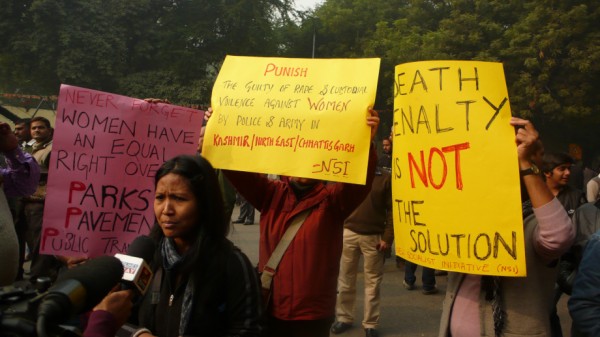Protests against sexual violence continued for the third day in Delhi. The venue had shifted from the India Gate-Rajpath environs to Jantar Mantar. Despite the fact that the government had closed metro stops in central New Delhi (from Rajiv Chowk to Khan Market) so that Vladimir Putin was spared the embarrassment of having to encounter protestors against rape, even as he sold gas and guns, a motley crowd of mostly young women and men were able to make their way to Jantar Mantar.
Yamraj, the God of Death, who is so in demand these days, was amongst them. He came, wearing a horned helmet, bearing a sign that he personally wanted to hang rapists. But then, he was confronted by the unlikely sight of several young women and men protesting against rape and also making their views against the death penalty heard loud and clear. He was confused at first. Had he landed at the wrong protest? But then, after listening attentively to those who were outraged yet not bloodthirsty, he too changed his mind, tore up his original sign and turned into an anti-death-penalty activist.
The demonstration was totally peaceful, non-aggressive and a space for many different points of view. What was evident was a broad spectrum of groups, identities, interests, initiatives and organizations. No one tried to dominate the space. No one tried to set any one agenda. The most interesting set of slogans were full throated revivals of calls from the Feminist movement:
“Bus mein chahiye Azadi, Dafter mein chahiye Azadi, Sadkon mein chahiye Azadi, Gharon mein chahiyen Azad, Din ko lenge Azadi, aur Raat ko lenge, Azadi …(freedom in the buses, freedom in the workplace, freedom in the home, freedom in the street, freedom by day, freedom by night.”
Here was a new generation of young women (and men) rediscovering the heritage of feminism on the streets of Delhi. Snatching it from the air around them, making it their own. In their voices, I heard the echo not only of their feminist predecessors, but also of their peers in Kashmir, who have made the air of Srinagar resound with the rhythmic syncopation between who they are (‘Hum Kya Chahtey’ – ‘What Do We Want’) and what they want (‘Azaadi’ – ‘Freedom’)
The demonstrators spoke against moral policing and the patronizing attitudes of politicians and the administration. Several women present spoke out in public, saying that they would wear what they wanted to wear, go where they wanted to go, and when they wanted to go, because this city was theirs and no one had any business telling them what to do. Many people insisted that the government had no business shutting down public transport. People demanded better street lights, better transport, safe, non-sexist environments in workplaces, schools, colleges and public spaces.






